The Islamic World
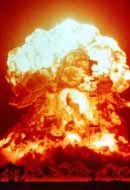 The End is Nigh
The End is NighFriday, July 6, 2012 by Allan Arkush | Jewish Ideas Daily » Daily Features
Richard Landes tells us on the very first page of Heaven on Earth: The Varieties of the Millennial Experience that he isn’t going to confine himself to the usual suspects.
 The Six-Day War: Day Six
The Six-Day War: Day SixAfter five days spent battling Arab forces, Israel now faced a new opponent: time. With the Egyptians and Jordanians out of the war, and the Syrians having agreed to a ceasefire, the Security Council was becoming restless.
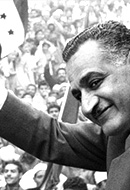 The Six-Day War: Day Five
The Six-Day War: Day FiveOnce Dayan decided against a limited attack in the Golan and opted instead to take the entire Heights, Israel's air force pounded the Syrians. The Syrians had supposed the Israelis to be tired and intimidated by their incessant shelling . . .
 The Baron-Cohens and the Problem of Evil
The Baron-Cohens and the Problem of EvilThursday, May 31, 2012 by Allan Nadler | Jewish Ideas Daily » Daily Features
The pervasiveness of evil and the suffering of innocents have confounded religious believers throughout history. Jews have produced a vast literature that attempts to reconcile God's justice with evil's apparent dominion.
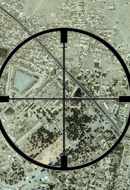 Find, Fix, Finish
Find, Fix, FinishTuesday, May 1, 2012 by Alex Joffe | Jewish Ideas Daily » Daily Features
What is the threat? Al-Qaeda? "Terrorism"? "Violent religious extremism"? Israeli analysts call it "global jihad," but U.S. leadership has carefully circumscribed it as "al-Qaeda" or, even more narrowly, personified it as Osama bin Laden and his minions, hijackers of planes and Islam.
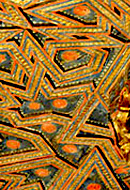 Art against History
Art against HistoryThursday, March 29, 2012 by Alex Joffe | Jewish Ideas Daily » Daily Features
Antiquity washes away the immediacy of historical pain and injustice. Our ability to feel suffering is indexed directly to its epoch: the more remote, the more detached we are. Museums play on this—pander to this—and to our forgetfulness. History is softened, elided, or erased.
 Marching to Jerusalem
Marching to JerusalemThursday, March 22, 2012 by Alex Joffe | Jewish Ideas Daily » Daily Features
Protests, marches, sit-ins, boycotts—all these nonviolent techniques have been employed in support of the Palestinian cause, but violence has remained at the core of the enterprise. For decades, well-meaning people have suggested that a wholehearted embrace of nonviolence would do more for the Palestinians than their continuing resort to terrorism.
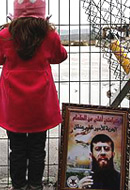 Martyr in Waiting
Martyr in WaitingFriday, March 16, 2012 by Elliot Jager | Jewish Ideas Daily » Daily Features
The Palestinian Islamic Jihad operative Khader Adnan, currently under administrative detention in Israel, has announced the end of his 66-day hunger strike in exchange for a commitment by Israeli authorities to set him free on April 17. His pending release raises a moral dilemma.
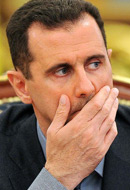 The Butcher and the Surgeon
The Butcher and the SurgeonMonday, March 12, 2012 by Micah D. Halpern | Jewish Ideas Daily » Daily Features
They call Bashar al-Assad "son of the butcher," but he is merely a butcher twice removed. The original butcher of Syria was Abul Abbas al-Saffah, the last appellation meaning "shedder of blood."
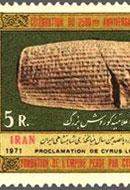 Cyrus, Ahmadinejad, and the Politics of Purim
Cyrus, Ahmadinejad, and the Politics of PurimWednesday, March 7, 2012 by Alex Joffe | Jewish Ideas Daily » Daily Features
At this week's pre-Purim meeting in Washington between President Obama and Prime Minister Netanyahu to discuss Iran's nuclear threat to Israel, Netanyahu gave Obama a present: the book (or m'gilah, scroll) of Esther, which tells how the Jewish heroine foiled Haman's plot to kill the Jews of ancient Persia.
Editors' Picks
Abraham's Magnificent Home Town Jane Arraf, Christian Science Monitor. A British archeologist, returned to Iraq for the first time in a quarter-century, unearths a temple or palace of “breathtaking” size near the Ur of Abraham’s era.
Iran the Peacemaker Mitch Ginsburg, Times of Israel. Netanyahu’s apology to the Turkish prime minister may have been a diplomatic coup by Barack Obama—or a sign of recognition by Israel and Turkey of their common interest against Iran.
One Jew Too Many Adam Levick, Algemeiner. Libya recently barred Bernard-Henri Levy from visiting because he is Jewish. The Libyans are merely being consistent: by 2004 they had managed to drive out every one of their Jews.
European Muslims: The Quiet Revolution Ari Varon, Haaretz. It’s the radical Islamists who get the headlines. But in the background, European Muslims, for the first time in Islamic history, may be developing a locally based Islamic-European identity.
The Real Enemy Abdulateef Al-Mulhim, Arab News. “What was the real cost for not recognizing Israel in 1948 and why didn’t the Arab states spend their assets on education, health care, and the infrastructures instead of wars?”
How Orientalism Shaped Obama Lee Smith, Tablet. Blaming the recent attacks against U.S. targets on a cheap video reflects Edward Said’s argument that Europe subjugated Muslims by distorting perceptions of their culture.
Libya Murders, Two: What They Said , New York Times. U.S. Embassy in Egypt condemns efforts to “hurt the religious feelings of Muslims.” Mob murders U.S. Ambassador to Libya. Embassy says its statement “still stands.” Administration begins walking it back.
Lebanon’s Unholy Bedfellows Hilal Khashan, Middle East Quarterly. In Lebanon the Maronites are Christian liberals, while the Shiites are Islamic theocrats. The contradiction hasn’t kept them from an alliance based on resentment of Sunni domination.
The Forgotten Refugees Ron Prosor, Huffington Post. When the United Nations marks World Refugee Day this month, one group will be curiously absent from their commemorations: the 850,000 Jewish refugees from Arab countries.
How I Became an Islamist Maajid Nawaz, Jewish Chronicle. Now a democratic activist, at the time the author joined the pan-Islamic Hizb ut Tahrir, he was a disaffected British teenager who had never read the Koran.

